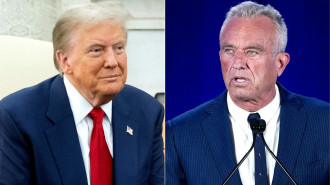Female social media influencers targeted by Egyptian authorities as country reels from #MeToo: HRW
Female social media influencers targeted by Egyptian authorities as country reels from #MeToo: HRW
Female social media influencers are being arrested in Egypt for trumped up charges as the country reels from #MeToo.
4 min read
The #MeToo movement continues [Getty]
Egypt authorities have since April 2020 launched a targeted campaign against female social media influencers on charges that violate their rights to privacy, freedom of expression, and non-discrimination, Human Rights Watch revealed.
At least 15 people, including a 17-year-old girl, have been arrested on vague charges such as violating “public morals” and undermining family values”.
Aya, the 17-year-old who is known on social media as “Menna Abdelaziz” was arrested on 28 May, six days after she posted a video in which her face appeared to be bruised.
In the video, she said she was beaten by a group of men and women, and alleged that the men raped her, filmed the acts and then blackmailed her for the footage.
On 30 May, the Office of the Prosecutor General issued a statement saying prosecutors ordered her detainment pending investigation as a victim of sexual assault, but also as a suspect in morality-related offenses for her videos generally.
Many of the women were arrested based on what authorities said were “indecent” videos on social media applications, particularly the TikTok app.
Yet in the majority of the videos and photos, the women appear fully dressed, at times singing or dancing. Those prosecuted have large followings on social media in the hundreds of thousands or millions.
“Arresting women and girls on very vague grounds simply for posting videos and photos of themselves on social media sites is discriminatory and directly violates their right to free expression,” said Rothna Begum, senior women’s rights researcher at Human Rights Watch.
“Policing women’s peaceful conduct online smacks of a new effort to control women’s use of public spaces.”
Such prosecutions appear to be the first use of morality charges under the 2018 cybercrimes law.
Some cases, the prosecutor general said, began after “social media users” complained about the videos on the prosecution’s Facebook page.
Courts have already sentenced two of the women and the three men to two years in prison and two more women in separate incidents to three years. The remaining seven women and another girl face ongoing prosecutions.
|
The first arrest, on April 21, was of Hanin Hossam, 20, a university student and social media celebrity with hundreds of thousands of followers on TikTok and Instagram.
The prosecution’s main evidence against her was a video she posted on TikTok, which Human Rights Watch reviewed, inviting her women followers to use another video-sharing platform, Likee, telling them they can earn money by making live videos for the app.
Other arrests followed a May 2 statement by the Office of the Prosecutor General that said “forces of evil” were abusing the “new virtual electronic space” to “destroy our society, demolish its values and principles and steal its innocence.”
Egypt and #MeToo
“The Egyptian government is on a campaign to arrest and prosecute women influencers on... TikTok for violating 'the values of the Egyptian family' and 'inciting debauchery and immorality,'" Access Now said in a statement.
The Egyptian authorities "not only want to control what citizens say, but also how they should dress, talk, and behave online," said Marwa Fatafta, the group's Middle East and North Africa policy manager.
Egypt has in recent years enforced strict internet controls as it walks a tight line between balancing the Islamic law that shapes its governance and adapting to a rapidly shifting society with a penchant for social media content.
Stringent laws were approved in 2018 allowing authorities to block websites seen as a threat to national security and to monitor personal social media accounts with over 5,000 followers.
"In the past, the Egyptian regime tightened its stronghold on the internet... Now, the online repression extends to non-political activity too," said Fatafta.
Comedians, academics, bloggers, journalists, political dissidents, lawyers and activists are among those who have been jailed in recent years, and a music video director has died in custody.
Imprisoning social media influencers, the latest group to be targeted, "has nothing to do with protecting social values. It's about internet policing and control," Access Now's Fatafta said.
"With the massive increase in content creators and influencers on TikTok in Egypt, there is a high risk that more prosecutions targeting this community are yet to come," the organisation added.







 Follow the Middle East's top stories in English at The New Arab on Google News
Follow the Middle East's top stories in English at The New Arab on Google News
![The new film casts Israeli actors to tell the story of Mary while leaving out Palestinians [Getty]](/sites/default/files/styles/image_330x185/public/2024-11/GettyImages-2172155541.jpg?h=199d8c1f&itok=wJWyXDEQ)
![Ben & Jerry's has taken Unilever to court for its alleged attempts to silence it [Getty]](/sites/default/files/styles/image_330x185/public/2024-11/GettyImages-2183900214.jpg?h=199d8c1f&itok=jEcYtQ64)
